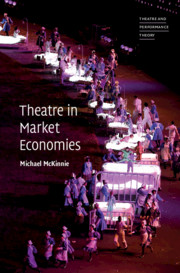‘… extraordinarily lucid and erudite … a most welcome, mature and sophisticated example of the engaged materialist analysis that has been a particular strength of his earlier work.’
Trish Reid
Source: Theatre Research International
‘Billed too modestly as a contemporary study, the book in fact offers a concise but sweeping history of key ideas and landmarks in theatre and political economy since the 1850s: nineteenth-century industrialization, the waxing and waning postwar UK welfare state, Irish peace in the 1990s, North American border panics after 9/11, and austerity politics in the 2010s. In all of these frameworks, McKinnie sees and communicates clearly how the mechanics of theatre making make political and economic meaning as much as, if not more than, the theatrical performance.’
Derek Miller
Source: Theatre Survey
‘His arguments are, to my knowledge, novel, and therefore illuminating, but the book’s greatest strength is the measured intricacy of its argument. Addressing himself to an audience of theatre scholars, McKinnie walks readers clearly and effectively through economic theory in order to build his analysis. That he achieves this in the efficiency of 157 pages of body text is especially laudable. Theatre in Market Economies proves a valuable contribution to any consideration of theatre’s place in contemporary society and its contributions to an evolving, market-driven world.’
Patrick Maley
Source: Modern Drama
‘Theatre scholars seeking to integrate economic analyses with their investigations of contemporary arts institutions have something to celebrate: the arrival of Michael McKinnie’s Theatre in Market Economies. The book blasts through disciplinary boundaries to pursue the 'evolving' nature of theatre’s relationship with political economy.'
Hillary Miller
Source: Contemporary Theatre Review
‘McKinnie’s study manages … to illustrate admirably the epistemological and pedagogical significance of theatre in the present moment.’
Konstantinos Blatanis
Source: European Journal of American Studies
‘… a rigorous study whose interdisciplinary applications invite interlocutors from fields that don’t interact often enough with one another. And apart from being a text I admire personally, I’ve found it a fabulous resource in the classroom.’
Alex Ferrone
Source: Theatre Journal



